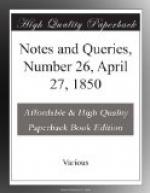Anthony Rich, Jun.
* * * * *
QUERIES.
WHEN WERE UMBRELLAS INTRODUCED INTO ENGLAND?
Thomas Coryat, in his Crudities, vol. i. p. 134., gives us a curious notice of the early use of the umbrella in Italy. Speaking of fans, he says:
“These fans are of a mean price, for a man may buy one of the fairest of them for so much money as countervaileth one English groat. Also many of them (the Italians) do carry other fine things of a far greater price, that will cost at the least a ducat, which they commonly call in the Italian tongue umbrellaes, that is, things that minister shadow unto them for shelter against the scorching heat of the sun. These are made of leather, something answerable to the form of a little canopy, and hooped in the inside with diverse little wooden hoops that extend the umbrella in a pretty large compass. They are used especially by horsemen, who carry them in their hands when they ride, fastening the end of the handle upon one of their thighs: and they impart so long a shadow unto them, that it keepeth the heat of the sun from the upper parts of their bodies.”
Lt.-Col. (afterwards Gen.) Wolfe, writing from Paris, in the year 1752, says:
“The people here use umbrellas in hot weather to defend them from the sun, and something of the same kind to secure them from snow and rain. I wonder a practice so useful is not introduced in England, (where there are such frequent showers,) and especially in the country, where they can be expanded without any inconveniency.” {415}
Query, what is the date of the first introduction of the umbrella into England?
Edward F. Rimbault
* * * * *
MINOR QUERIES.
Duke of Marlborough.—The Annual Register for the year 1758 (pp. 121-127.) contains an account of the circumstances connected with the trial of one Barnard, son of a surveyor in Abingdon Buildings, Westminster, on a charge of sending letters to the Duke of Marlborough, threatening his life by means “too fatal to be eluded by the power of physic,” unless his grace “procured him a genteel support for his life.” The incidents are truly remarkable, pointing most suspiciously toward Barnard; but he escaped. Can any of your readers refer me to where I can find any further account or elucidation of this affair?
Buriensis.
“M. or N.”—Of what words are “M. or N.” the initials? Vide the answers to be given in the Church Catechism, and some of the occasional offices in he liturgy.
J.C.
[It has been suggested that “M. or N.” originated in a misreading of “NOM,” a contraction for “nomen.” This is certainly an ingenious explanation, though not a satisfactory one.]
Song of the Bees.—Who was the author of the lines under this title beginning,




